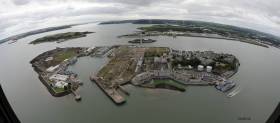Displaying items by tag: PDforra Low Pay
Defence Forces Head Seeks to Address Commission Directly Over Pay
#NavalService - The Irish Times writes that the head of Defence Forces has sought to make a verbal submission to the Public Sector Pay Commission because of the seriousness of the military pay issue in the view of himself and senior colleagues.
Chief of Staff of the Defence Forces Vice Admiral Mark Mellett declined to use the word “crisis” saying he preferred to say the military was facing serious “challenges”.
He was speaking on Tuesday before addressing the annual conference of PDforra, the Defence Forces’ rank-and-file representative body, in Castlebar, Co Mayo.
His remarks came in the wake of two Naval Service vessels being unable to put to sea last week (see Afloat's related coverage) because of crew shortages, and reservists being used to fill crew gaps on another vessel.
The problems prompted Vice Admiral Mellett and his assistant Chief of Staff, Brig Gen Peter O’Halloran, to hold emergency talks last Friday with the Naval Service Flag Officer Commanding, Cdr Mick Malone. For much more from the newspaper click here.
Also the story appears in The Irish Mirror which adds that morale is at an all-time low in the Naval Service with 66 sailors staying on board their ships because they can’t afford high rental prices.
The revelation was made by Mark Keane, president of PDFORRA, the organisation that represents members of the Defence Forces. Mr Keane lifted the lid on the discontent in the ranks at the naval base on Haulbowline Island in Cork Harbour.
For further reading including comments made by the president also speaking at the conference held in Mayo, click here.






























































